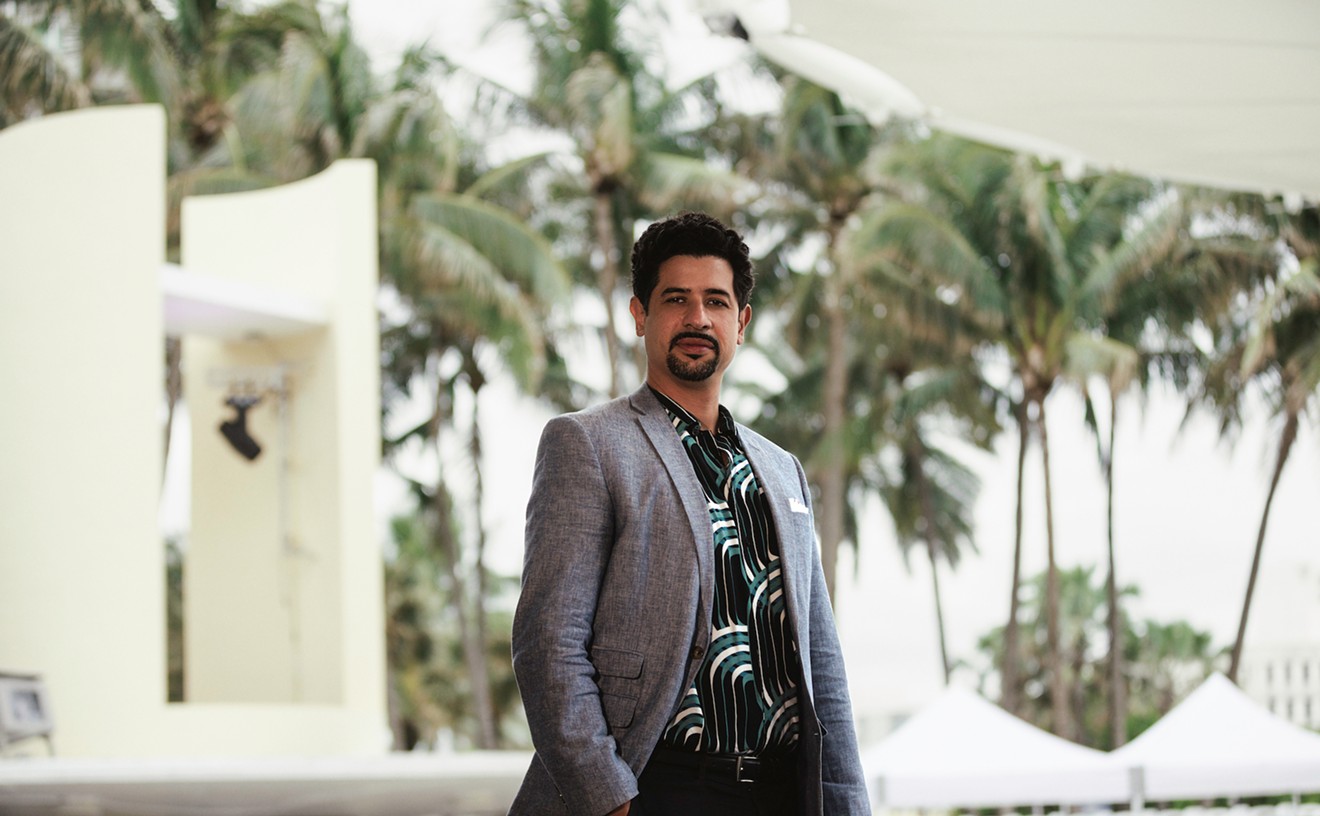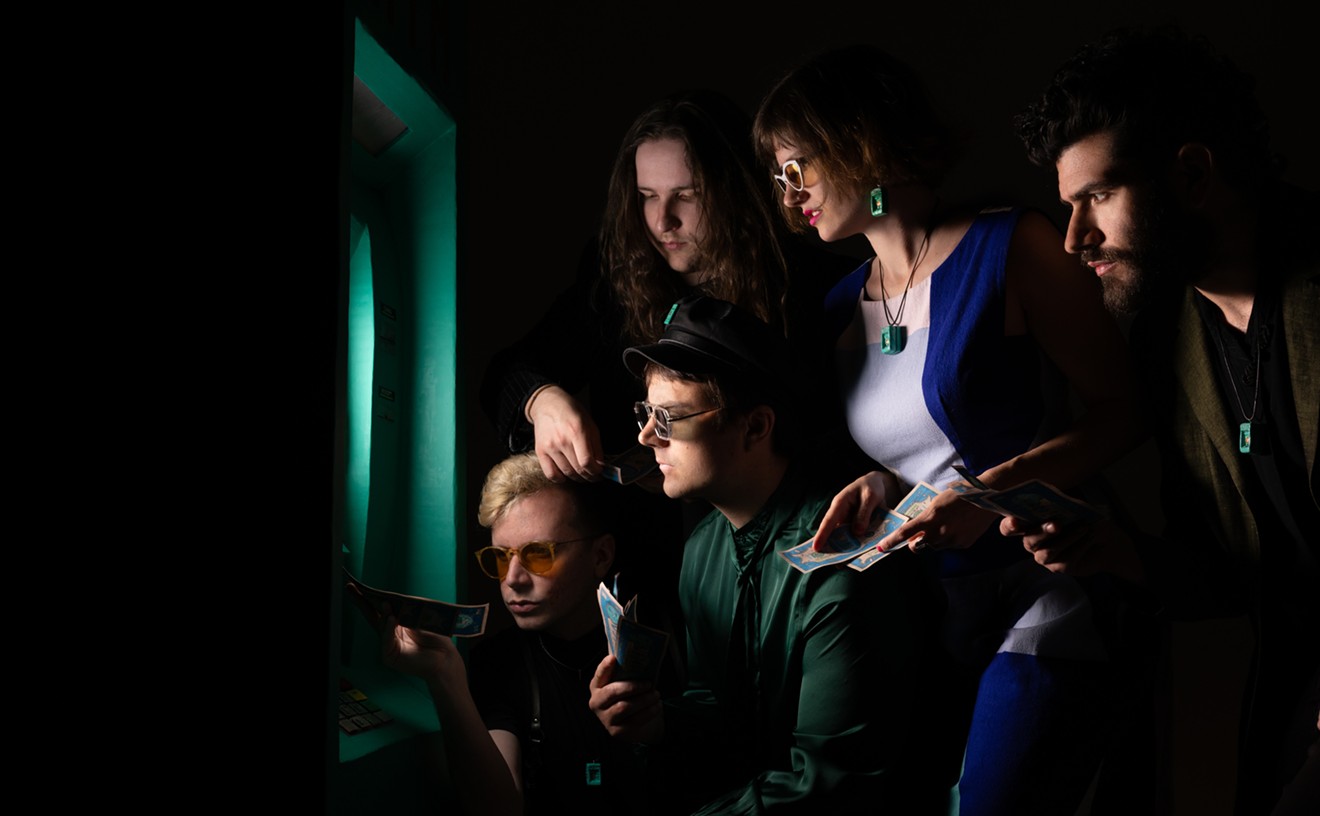Since 1993 the Washington, D.C.-based indie-rock trio has garnered a reputation as a purveyor of eccentric instrumentals that merge the cold electronics of Krautrock and the hot dynamics of classic Seventies FM-radio. Over the course of its last two records, the band has tentatively begun adding vocals while maintaining its enigmatic, tongue-in-cheek, prog-rock essence. Packing a full album's worth of not-yet-released new material, Trans Am will headline Friday night's "Playtime" -- a multimedia event featuring art, music, DJs, and puppetry -- held inside the Polish-American Club.
Right now the members of Trans Am are still home in D.C., sitting around their own National Recording Studio, listening to playbacks of the sessions that will eventually add up to the new disc. They have only a couple of days to hear and approve the final recordings before they hit the road for a three-week U.S. tour. Guitarist/keyboardist Phil Manley says the group's upcoming performances, like the new album, will focus even more on singing, with increasingly accessible songs averaging an easily digestible three minutes, boiling down instrumentals to brief, in-between interludes. Manley hopes to see the as-yet-untitled album released by the spring of next year and postulates that it will travel a more pop/dance-paved road, taking a wide turn away from the art-rock veneer of Trans Am's previous long-player, 2000's Red Line.
"That was really us going into the studio and doing whatever we wanted," explains drummer/button-tweaker Sebastian Thomson of the 73-minute release, which was meticulously constructed over a period of three months. Red Line (also issued as a retro-friendly double vinyl package) veers wildly across the spectrum with dense, 60-second drum onslaughts sprung from the horn of Africa, abstract electronic idm pieces, and dynamic sing-alongs that feature mock-futuristic vocoders or an intentionally amateurish garage-band attack. About midalbum comes the nearly ten-minute-long centerpiece, "Dark Gift," a majestic work that opens with the pleasant dual melody of acoustic guitars, gets pummeled by Thomson's intense drum work, yet perseveres to float on ambient waves of lush, droning synthesizer chords, finally fading away in the comfort of cooing vocals.
According to Manley, all three members are taking turns writing lyrics and singing on the new album, continuing a move begun on 1999's Futureworld, the band's fourth album, and explored further on seven of Red Line's 22 tracks. Previous Trans Am releases had included just sampled voices, and then only sporadically. Despite this seeming reluctance to give Trans Am a focal point, singing was a common element when the group started as a project put together by a quartet of high school kids bored with the suburban confines of Bethesda and Gaithersburg, just outside D.C. Not that their initial leanings did much to alleviate this tedium. "We covered songs by Hendrix and Stevie Ray Vaughan, classic-rock stuff," says bassist/keyboardist Nathan Means.
"We had a singer then," points out Manley. When the vocalist quit, the band became an instrumental trio by default, calling itself Trans Am, a name emblematic of the group's humorous look back at heavy rock. During these embryonic years, Manley says, the music amounted to little more than cheeky MOR staples performed by three young musicians -- until Thomson's older brother introduced them to Kraftwerk.
"He had a bunch of albums by them," recalls Means. "I don't remember what specific album we heard, off the top of my head. I just remember it was phenomenal, weird, funny, and amazing." A seed was planted in the Trans Am collective. Then, during a frustrating rehearsal and desperate for some divine inspiration, Manley picked up a tiny portable keyboard Thomson brought into the studio. He put batteries into the Casio, triggered one of the prerecorded rhythms stored in its memory bank, and the rest is proverbial history. The robo-funk of Kraftwerk became as important to the trio as Rush's busy time signatures had already been -- making for an unlikely modern primitivism heard on Trans Am's early records.
The group's first recordings consisted of three live songs released on a 1993 EP, followed by a track on a Strength magazine compilation in 1995. That was the extent of the barely rehearsed band's output until it was discovered by John McEntire, famed member of Chicago's perennial postrock outfits Tortoise and the Sea and Cake and producer of many an important indie act, most notably a long-standing affiliation with Stereolab. McEntire persuaded the powers at Thrill Jockey, Tortoise's Windy City-based record label, to give Trans Am a recording deal, offering his production services. The result was Trans Am's self-titled 1996 debut full-length, followed by the glowering Surrender to the Night (1997); the satiric, meandering The Surveillance (1998); and last year's collection of singles, B-sides, and live material, You Can Always Get What You Want.
Trans Am's newest release is October's Double Exposure, a tight, five-track collaboration with the San Francisco-based rock trio the Fucking Champs. The recording includes all members of each band, and guest musicians contribute flute and violins. Fusing the two units resulted in the decision to release the album under the hybrid handle Trans Champs. Defined by power-chord-laden instrumentals and technical guitar wizardry, the Fucking Champs were the perfect foil for Trans Am's more minimalist aesthetic, says Thomson. The two groups shared many tours together, with one bringing them to Fort Lauderdale's FUBAR (now Freez) in 1999. During that bonding experience, the double trios found the inspiration to make a record together, and after a slew of typical scheduling conflicts, the result exuded influences as diverse as King Crimson, Neu!, and even Van Halen -- without guilt or remorse.
"I love it," says Fucking Champs guitarist/keyboardist Tim Green from his San Francisco-based Louder Studios. "I really, really like it a lot. Something about the songs just makes me happy." Thomson relates that Trans Am is also suitably pleased with Double Exposure, with plans for a sophomore Trans Champs effort.
In the meantime Trans Am stands with bags packed in preparation for another tour that will take the intrepid trio to Miami for its first-ever performance in America's southernmost major city. "We've been asking to go down there for a long time," says Manley, "but booking agents don't like to do shows there because it's not on the way to anywhere. I have no idea what to expect, but I'm real excited about it."











